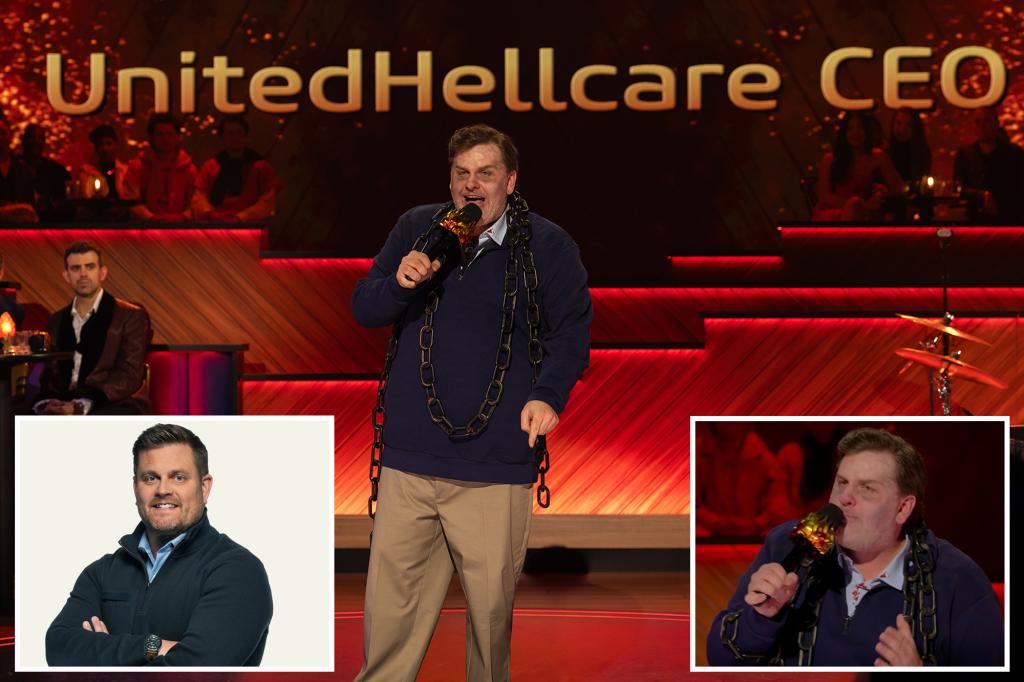Paragraph 1: A Controversial Comedy Act
Comedian Tim Dillon sparked a wave of controversy with his performance in Netflix’s "Torching 2024: A Roast of the Year." Dressed as the recently murdered UnitedHealthcare CEO, Brian Thompson, Dillon’s act pushed the boundaries of dark humor, leaving audiences with a mix of nervous laughter, shocked gasps, and outright disapproval. His portrayal of Thompson, complete with a blood-stained shirt, gray makeup, and chains, immediately established the provocative nature of the bit. While some found his jokes audacious and funny, others criticized the routine for its insensitivity, particularly given the recent and tragic circumstances of Thompson’s death. The performance ignited a debate about the limits of comedy and whether certain topics, especially recent tragedies, should remain off-limits.
Paragraph 2: Dillon’s Impersonation and Dark Humor
Dillon’s impersonation of Thompson was meticulous, capturing not only the CEO’s appearance but also the public perception of UnitedHealthcare’s practices. He opened by acknowledging the potential backlash, admitting he was "going to hell" for the performance and inviting the audience to laugh along. Referencing Thompson’s death, Dillon, as the CEO, expressed disdain for those who celebrated his demise. The comedian then skillfully intertwined dark humor with social commentary, using Thompson’s persona to satirize the healthcare industry, particularly UnitedHealthcare’s reputation for denying claims. He highlighted the company’s high denial rate, turning it into a punchline that resonated with many who have experienced frustrations with the healthcare system.
Paragraph 3: Satire and Social Commentary
Dillon’s performance went beyond simple impersonation; it was a biting satire of corporate greed and the healthcare industry’s complexities. Through his dark humor, he touched upon the frustrations many people experience with health insurance companies, particularly the perceived prioritization of profits over patient care. The jokes about claim denials and the indifference of corporations to individual struggles resonated with some viewers, who saw it as a form of social commentary disguised as dark comedy. However, this approach also drew criticism for potentially trivializing a serious issue and the tragic loss of life. The performance became a microcosm of the broader debate about the role of satire in addressing sensitive social issues.
Paragraph 4: Reactions and the Line of Decency
The audience’s reaction to Dillon’s performance was a mixture of amused discomfort and outright shock. Some found his audacity refreshing, appreciating the willingness to tackle taboo subjects, while others felt he crossed the line of decency. The groans of shock interspersed with laughter underscored the divisive nature of the act. The controversy extended beyond the live audience, spilling onto social media, where opinions were sharply divided. Some praised Dillon for his fearless approach to comedy, viewing it as a necessary challenge to societal norms, while others condemned it as insensitive and exploitative, arguing that it’s too soon to joke about such a tragic event.
Paragraph 5: The Context of the Roast Format
The “Torching 2024” roast format, known for its edgy and often controversial humor, provided a unique context for Dillon’s performance. Roasts traditionally involve poking fun at individuals and societal issues, pushing the boundaries of acceptable discourse. However, even within this context, Dillon’s act stood out for its boldness. The roast format offered a platform for this type of humor, but it also intensified the debate about what constitutes acceptable satire, especially when dealing with recent tragedies. Some argued that the roast provided a space for cathartic laughter and social commentary, while others felt that it simply provided cover for insensitive and exploitative jokes.
Paragraph 6: The Aftermath and Broader Implications
Dillon’s performance sparked a wider conversation about the limits of comedy and the ethics of using tragedy as comedic fodder. While some see dark humor as a way to process difficult events and challenge societal norms, others argue that it can trivialize suffering and cause further pain. The controversy surrounding Dillon’s act highlights the ongoing debate about the responsibility of comedians to consider the potential impact of their material, particularly when addressing sensitive topics. It also raises questions about the evolving landscape of comedy in an increasingly polarized society, where the line between satire and insensitivity can be blurred. Dillon’s performance serves as a case study for examining these complex issues and the challenges of navigating the evolving boundaries of comedic expression.


